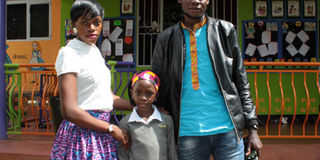Girl whose mum was shot in 2011 now fears police

Miraculous. Miracle Mwajjab Nabazira (Centre) poses with her parents Nasser Walukagga and Brenda Nalwendo. Inset is Ms Nalwendo on her hospital bed after being shot in 2011. PHOTO BY ANDREW BAGALA
What you need to know:
- A US Department of State report last year pinned government on various human rights violations, including arbitrary killings, torture and cruel treatment, poor conditions in detention centres and harassment of position politicians.
- Ms Nalwendo’s situation has left a mark on her daughter. Nabazira says she wants to be a nurse so that she can treat people beaten by the police officers.
KAMPALA. Miracle Mwajjab Nabazira, 6, is a Primary One pupil at Genesis Nursery and Day Care School in Kalambi village on Mityana Road.
Nabazira at her age understands the politics going on in the country. Her parents, Mr Nasser Walukagga and Ms Brenda Nalwendo, say when she sees a police officer in uniform, she runs as fast as her legs can take her.
“She is open about it,” Ms Nalwendo says.
Asked why she is so afraid of the uniformed police, Nabazira responds: “They shot my mother.”
Indeed, police officers did. Ms Nalwendo says on the morning of April 14, 2011, she had parted with her husband on her way to hospital for an antenatal check-up when she suddenly heard gunshots and people running.
“There was a stampede and I was knocked down. As I was down, a police officer in uniform came closer
to me and shot me in the right hand.
As I attempted to run away, the officer shot me in the abdomen and my intestines poured out. Blood was all over me,” Ms Nalwendo says.
To her surprise, the officer hurled a tear gas canister that exploded near her chest, leaving her with serious skin injuries around the neck and chest. She says officers wanted to push her below the patrol pickup
seats but the people insisted that she is put in the seat. Mr Walukagga says he was in a salon when he was called by someone informing her about a woman, who had been shot.
“At first, I thought it was my female friend who had been shot. My friend had separated with her husband. The caller insisted that it was Brenda, my wife; I nearly collapsed. I drove to the scene, but she had been taken to Mulago [National Referral Hospital]. I followed her,” Mr Walukagga says.
At Mulago, medical officers refused to attend to her since tear gas was irritating them. Nalwendo says: “Later a nurse told me that ‘we have established that baby in your womb is dead.
What we are trying to do is to save your life. So sign her and we take you to the theatre’. I had nothing to do but to sign.”
Successful surgery
Lucky enough for Nalwendo, the surgery was successful and the baby was unaffected.
Mr Walukagga says after the surgery, the medical officers ordered him to bring bed sheets for the patient.
“I didn’t have one. There is a man called Sserubira, a casual worker at Mulago, who took me to the hospital store and gave me a bed sheet and
blanket. He said ‘take them for good’,” he says.
He says the following day, no medical officers came to attend to his wife, “I was told that her medical file was missing. It took hours to trace it because they had erased my wife’s prompting him to inquire from the administrators.
It was after the file’s recovery that she was attended to. The file
went missing again. It was again found after intervention of senior medical officers,” he says.
The family was in short of funds but Foundation for Human Rights Initiative, a civil society organisation, came to their help.
“As soon as they had started the payments, police came in and committed themselves to footing the bills of the treatment and delivery. When my wife delivered, they stopped,” he says.
Thereafter, Nalwendo decided to take the case to court but police officers, led by then Commissioner Judith Nabakooba, often intervened and sought for dialogue.
“Police officers would tell us that they would give my wife treatment if we withdrew the case from court. We would tell them to make a written commitment but they always declined, so we continued with the process,” he says. In court, the police officers declined to testify.
The judge called for a medical file for examination but it went missing again and it was never recovered.
The case, which was concluded on July 13, has been before Lady Justice Henrietta Wolayo. Court had to rely on witnesses to take a decision to award Shs130m to the victim.
Court ruling
The Attorney General agreed to pay Shs80m as general damages, Shs20m as exemplary damages
(punishment to deter others from doing the same), $6,500 (Shs23.3m) for further treatment, $800 to Ms Nalwendo (Shs2.8m) and Shs5m for upkeep when she goes to India for treatment.
Mr Walukagga says a struggle to save his wife has left him in debts.
“At the time she was shot, we were in the final preparation of our introduction ceremony. I had paid money to the service providers. All that money was wasted. I had a car and plots of land which I sold to save my wife and child’s lives. I even took loans. I have not repaid many of
them,” Mr Walukagga says.
Ms Pamela Diana Nalunkuuma, the victim’s lawyer, says the money given to Ms Nalwendo is peanuts considering the injuries she sustained, but they decided to take the offer to allow her get the treatment in India that she badly needs. The Shs130m compensation to Ms Nalwendo will be deducted from police’s budget as per the Attorney General directives.
Ms Nalwendo’s situation has left a mark on her daughter. Nabazira says she wants to be a nurse so that she can treat people beaten by the police officers.




